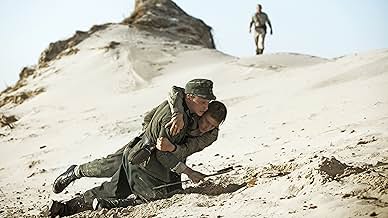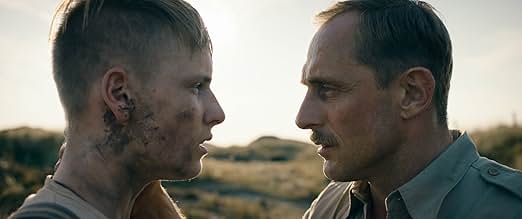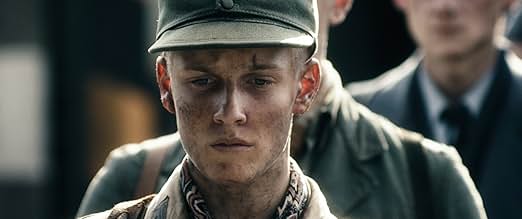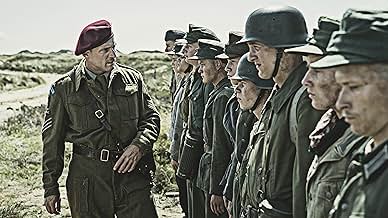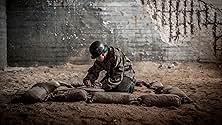VALUTAZIONE IMDb
7,8/10
48.053
LA TUA VALUTAZIONE
Nella Danimarca del secondo dopoguerra, un gruppo di giovani prigionieri di guerra tedeschi sono costretti a ripulire una spiaggia di migliaia di mine antiuomo.Nella Danimarca del secondo dopoguerra, un gruppo di giovani prigionieri di guerra tedeschi sono costretti a ripulire una spiaggia di migliaia di mine antiuomo.Nella Danimarca del secondo dopoguerra, un gruppo di giovani prigionieri di guerra tedeschi sono costretti a ripulire una spiaggia di migliaia di mine antiuomo.
- Candidato a 1 Oscar
- 33 vittorie e 27 candidature totali
Zoe Zandvliet
- Elisabeth, Karins Daughter
- (as Zoé Zandvliet)
Max Beck
- August Kluger
- (as Maximilian Beck)
Recensioni in evidenza
A Danish war-drama that was inspired by the historical account, but all the characters were fictional. Remember this title for another six month, because I am confident this film will make a journey to the west coast of the USA to compete at the 89th Academy Awards in the coming February. I have seen many foreign films, but I'm not this much positive for any others. If this film fails to make, then that would be a great disappointment despite having no idea of what are the other four films. So this is just for now, my stance may change later.
Anyway, the film was heartbreakingly amazing. The WWII stories I had seen those told from the perspectives of the Australian, Japanese, Korean, Russian to African and European to the American western sea, Hawaii. And this is a Danish story, sets in just after the end of the war where prisoners of the war were used to clean up the mess. In the opening the teen German POWs were trained to defuse the land mine explosives and then later the unit was handed over to the Danish sergeant Carl Rasmussen where they are all going to work in one of the west coast landmines that was used to defend the Scandinavia by the Nazi. That is the story told how it all ends in the remaining parts.
This was like another 'Kajaki', but not actually a war film. Using of the prisoners as the labourers is a violation, according to the Geneva rule. That's the point of the film, focused to reveal the inhume act. But it was not anything like 'The Railway Man' 'Unbroken' or the 'The Bridge on the River Kwai'. Watching a film about the brave soldiers inspires us and bring patriotism, but in this those teen kid screaming whenever something goes wrong really brings heartache. So not everybody feels comfortable with it, especially the family audience. But there were lots of edgy moments and you would never know what events follows.
"If they are old enough to go to war, they are old enough to clean up."
It was shot is the real location, and I think that part contributed to depicting the actual atmosphere where most of the POWs lost their arms and legs and some exploded into many pieces in the air. It was a simple narration, but the visuals talked itself more than anything else. All the actors were outstanding, especially those 4-5 German teens and of course the Danish sergeant Carl. I think the Carl's influence had more impact, after seeing the opening scene where he went outrage and beat up those German soldiers returning home.
There are a couple of small twists, but there are some scenes which are not easy to get over. Even though we know those were just fake, but that does not work once you totally into the story deeply. This is a different kind of emotional film, something you rarely experience. The director who is also the writer must be appreciated for handling it perfectly. Especially keeping the screenplay uncomplicated and between the two nations, where in the real event involves the British officials. I have never seen his other films, but this one will define him forth and the people are going to recognise him. So I hope he'll keep up doing such level films in the future.
I have never seen such film, I mean seen some where the kids were tortured, but this was very unique and totally a different perspective for that takes place in the backdrop of the WWII. Especially the Germans perspective is the very rare kind. So I'm kind of thinking if Germany picks 'Look Who's Back' for the Oscars, the contest between these two would bring two different moods. At this point I don't remember any Danish film I have seen so far in my life other than this one which I feel is the best Danish film ever. I mean, come on, who would do such film where your own nation, if not the whole nation, the one who represent was shown in the negative shade over the Nazi Germans. This is definitely one of the best films of the year. Highly recommended.
8/10
Anyway, the film was heartbreakingly amazing. The WWII stories I had seen those told from the perspectives of the Australian, Japanese, Korean, Russian to African and European to the American western sea, Hawaii. And this is a Danish story, sets in just after the end of the war where prisoners of the war were used to clean up the mess. In the opening the teen German POWs were trained to defuse the land mine explosives and then later the unit was handed over to the Danish sergeant Carl Rasmussen where they are all going to work in one of the west coast landmines that was used to defend the Scandinavia by the Nazi. That is the story told how it all ends in the remaining parts.
This was like another 'Kajaki', but not actually a war film. Using of the prisoners as the labourers is a violation, according to the Geneva rule. That's the point of the film, focused to reveal the inhume act. But it was not anything like 'The Railway Man' 'Unbroken' or the 'The Bridge on the River Kwai'. Watching a film about the brave soldiers inspires us and bring patriotism, but in this those teen kid screaming whenever something goes wrong really brings heartache. So not everybody feels comfortable with it, especially the family audience. But there were lots of edgy moments and you would never know what events follows.
"If they are old enough to go to war, they are old enough to clean up."
It was shot is the real location, and I think that part contributed to depicting the actual atmosphere where most of the POWs lost their arms and legs and some exploded into many pieces in the air. It was a simple narration, but the visuals talked itself more than anything else. All the actors were outstanding, especially those 4-5 German teens and of course the Danish sergeant Carl. I think the Carl's influence had more impact, after seeing the opening scene where he went outrage and beat up those German soldiers returning home.
There are a couple of small twists, but there are some scenes which are not easy to get over. Even though we know those were just fake, but that does not work once you totally into the story deeply. This is a different kind of emotional film, something you rarely experience. The director who is also the writer must be appreciated for handling it perfectly. Especially keeping the screenplay uncomplicated and between the two nations, where in the real event involves the British officials. I have never seen his other films, but this one will define him forth and the people are going to recognise him. So I hope he'll keep up doing such level films in the future.
I have never seen such film, I mean seen some where the kids were tortured, but this was very unique and totally a different perspective for that takes place in the backdrop of the WWII. Especially the Germans perspective is the very rare kind. So I'm kind of thinking if Germany picks 'Look Who's Back' for the Oscars, the contest between these two would bring two different moods. At this point I don't remember any Danish film I have seen so far in my life other than this one which I feel is the best Danish film ever. I mean, come on, who would do such film where your own nation, if not the whole nation, the one who represent was shown in the negative shade over the Nazi Germans. This is definitely one of the best films of the year. Highly recommended.
8/10
10Duchino
My dear friend Ilario, a cultured movie buff, had warmly suggested this film these past days, among the many he mentions and those we get to talk about, and I could perceive that he had figured how this "Land of Mine" would strike many chords with me. And it did; I watched it in original German/Danish with English subs (shaky at times, but OK), and the immersion was immediate from the impactful start. I'm sensitive to war scenarios and characters – especially lesser told ones – as this story tactfully paints a very sad, cruel and almost hopeless reality. The Sergeant is a great figure, the kids are true to life, the skies and beaches cold and lonely too. And full of death. "Under Sandet", instead, is full of cinematographic art.
"Land of Mine" (2015 release from Denmark; original title: Under sandet, ('Under the Sand'); 100 min.) brings the story of a group of German POWs in Denmark. As the movie opens, we are reminded it is "Denmark, May 1945", right after the end of WW II. We get to know Danish Sgt. Rasmussen, who--after violently lashing out against German soldiers leaving the country--is assigned to de-mine an area on Denmark's western coast. Apparently the Nazis anticipated a possible invasion there, incorrectly as we all know. Rasmussen gets the help of about a dozen German soldiers who are ordered to actually do the work. When the soldiers arrive, it turns out most of them are just boys. As the Germans are trained on how to de-mine, one of them accidentally detonates a mine and dies. At this point we are a good 10 min. into the movie, but to tell you more of the plot would spoil your viewing experience, you'll just have to see for yourself how it all plays out.
Couple of comments: this is a high-profile (more on that later) and expensive (for European standards) production that brings to the big screen a post WWI episode not well known by the public at large (in the movie's end titles, we learn that more than 2,000 German soldiers were involved in this enormous mining clearance project). The movie's underlying tension (namely, at any time one of those landmines may detonate when making a minor error) rarely lets up, keeping us at the edge of our seat. On top of that, there are several outright brutal scenes involving Sgt. Rasmussen's attitude towards the boy soldiers (it somehow reminded me of the first half hour of Kubrick's Full Metal Jacket). All that said, while one certainly may have empathy for the boy soldiers as a group, I found it difficult to have the same emotional investment for the individual boys, as frankly they all seemed interchangeable to me within the movie's context. But in the end, this is an eye-opening movie on many levels. Danish actor Roland Møller in the role of Sgt. Rasmussen is nothing short of extraordinary.
"Land of Mine" received immediate critical acclaim upon its release in 2015 and in fact was nominated for the 2016 Best Foreign Language Movie Oscar, yes, LAST year's Oscars. I have no idea why this movie is just now opening up in US theaters, but better late than never I suppose. The Saturday matinée screening where I saw this at in Ft. Myers was attended very nicely, much to my surprise. If you are interested in a slice of WW II history that you may not be familiar with, I urge you to check this out, be it in theater, or later on Amazon Instant Video on eventually on DVD/Blu-ray. "Land of Mine" is HIGHLY RECOMMENDED!
Couple of comments: this is a high-profile (more on that later) and expensive (for European standards) production that brings to the big screen a post WWI episode not well known by the public at large (in the movie's end titles, we learn that more than 2,000 German soldiers were involved in this enormous mining clearance project). The movie's underlying tension (namely, at any time one of those landmines may detonate when making a minor error) rarely lets up, keeping us at the edge of our seat. On top of that, there are several outright brutal scenes involving Sgt. Rasmussen's attitude towards the boy soldiers (it somehow reminded me of the first half hour of Kubrick's Full Metal Jacket). All that said, while one certainly may have empathy for the boy soldiers as a group, I found it difficult to have the same emotional investment for the individual boys, as frankly they all seemed interchangeable to me within the movie's context. But in the end, this is an eye-opening movie on many levels. Danish actor Roland Møller in the role of Sgt. Rasmussen is nothing short of extraordinary.
"Land of Mine" received immediate critical acclaim upon its release in 2015 and in fact was nominated for the 2016 Best Foreign Language Movie Oscar, yes, LAST year's Oscars. I have no idea why this movie is just now opening up in US theaters, but better late than never I suppose. The Saturday matinée screening where I saw this at in Ft. Myers was attended very nicely, much to my surprise. If you are interested in a slice of WW II history that you may not be familiar with, I urge you to check this out, be it in theater, or later on Amazon Instant Video on eventually on DVD/Blu-ray. "Land of Mine" is HIGHLY RECOMMENDED!
In matters of war, no nation is free of guilt. Regardless of whether they are produced by victorious or vanquished countries, the better war films set out facts, acknowledge wrongdoing, express regret, and seek atonement. Many of them put guilt and culpability onto the widescreen so that current and future generations may learn from the past. This is the psychological space in which we find the extraordinary Danish-German war film Land of Mine (2016).
It is 1945 and the war is over, but the beautiful Danish coastline has two million deadly mines left buried in the sand by the Nazi occupation. Danish Sergeant Carl Rasmussen (Roland Møller) is assigned a squad of fourteen German prisoners of war who must clear a beach that contains 45,000 active mines. The Sergeant's treatment of the teenage boys is initially brutal: they live and work in terrible conditions, are practically starved and constantly reminded that everyone in Denmark hates them and nobody cares if they live or die. Their task is to crawl along the beach by hand, poking a stick in the sand to locate mines, then defuse them before they explode. Inevitably, many failed. With echoes of Stockholm syndrome, both captor and captives find glimpses of humanity in each other that leads to Rasmussen being suspected by his tormenting superiors of going soft on the Germans. He must walk the fine line between military obedience, personal hatred of Nazis, and his growing compassion and realisation that these are just boys who were conscripted into battle. His characterisation and its transition from hatred to acceptance frames the narrative of this high-tension drama.
Stunningly realistic cinematography with minute attention to detail amplifies the horror of this story. The acting is remarkable from a mostly unknown cast and Rasmussen's performance captures the very essence of moral conflict. The mine-clearing proceeds inch-by-agonising-inch, and the film's plot line inches forward at a similar pace. With camera at sand-level, we see close-up images of teenage warriors with beads of terror trickling down their faces as their sand-covered fingers slowly un-screw a detonator from a mine, knowing that an explosion will tear their body to pieces. These are some of the most heart-pulse racing moments you can experience through film. This is not entertainment nor is it for faint-hearted viewers; several scenes are horrific.
Most war films glorify battle or corner us into cheering one side or the other. This film presents an exquisite conundrum: was it morally acceptable for the Danish military to force German POWs to remove the deadly mines that the Nazi army left behind, knowing that most will die or be maimed? Or should this deadly work have been carried out by Danish soldiers? Was the inhumane treatment of teenage soldiers justifiable, regardless of the brutality of the Nazi occupation of Denmark? In the light of such questions, is this film one of justification or a confessional that seeks atonement? Land of Mine shines a bright light on what has hitherto been a dark secret of Danish history. It is a powerful and important story.
It is 1945 and the war is over, but the beautiful Danish coastline has two million deadly mines left buried in the sand by the Nazi occupation. Danish Sergeant Carl Rasmussen (Roland Møller) is assigned a squad of fourteen German prisoners of war who must clear a beach that contains 45,000 active mines. The Sergeant's treatment of the teenage boys is initially brutal: they live and work in terrible conditions, are practically starved and constantly reminded that everyone in Denmark hates them and nobody cares if they live or die. Their task is to crawl along the beach by hand, poking a stick in the sand to locate mines, then defuse them before they explode. Inevitably, many failed. With echoes of Stockholm syndrome, both captor and captives find glimpses of humanity in each other that leads to Rasmussen being suspected by his tormenting superiors of going soft on the Germans. He must walk the fine line between military obedience, personal hatred of Nazis, and his growing compassion and realisation that these are just boys who were conscripted into battle. His characterisation and its transition from hatred to acceptance frames the narrative of this high-tension drama.
Stunningly realistic cinematography with minute attention to detail amplifies the horror of this story. The acting is remarkable from a mostly unknown cast and Rasmussen's performance captures the very essence of moral conflict. The mine-clearing proceeds inch-by-agonising-inch, and the film's plot line inches forward at a similar pace. With camera at sand-level, we see close-up images of teenage warriors with beads of terror trickling down their faces as their sand-covered fingers slowly un-screw a detonator from a mine, knowing that an explosion will tear their body to pieces. These are some of the most heart-pulse racing moments you can experience through film. This is not entertainment nor is it for faint-hearted viewers; several scenes are horrific.
Most war films glorify battle or corner us into cheering one side or the other. This film presents an exquisite conundrum: was it morally acceptable for the Danish military to force German POWs to remove the deadly mines that the Nazi army left behind, knowing that most will die or be maimed? Or should this deadly work have been carried out by Danish soldiers? Was the inhumane treatment of teenage soldiers justifiable, regardless of the brutality of the Nazi occupation of Denmark? In the light of such questions, is this film one of justification or a confessional that seeks atonement? Land of Mine shines a bright light on what has hitherto been a dark secret of Danish history. It is a powerful and important story.
"Those of you who count the mines, make sure my card is updated. This task is as important as defusing mines." Sgt. Carl Rasmussen (Roland Moller)
In 1945, Denmark needed to defuse the over 2 million landmines left on their western beaches by the Nazis. A Danish sergeant is responsible for 14 German POWs, youngsters all, to find the 45 K on one beach, after which the boys can go home.
That precision mentioned in the opening quote lies at the heart of the film's considerable suspense because one unaccounted for mine can take multiple lives. And so, the sergeant has to corral teenage workers, motivate them with fear, and keep at bay his growing affection for them.
Therein lies the real suspense: Will he learn to love and protect them or will he be brutal as he was in the opening scene? For a story somewhat like Hurt Locker, Land of Mine is a minimalist work of complexity, unadorned with the usual tropes of thrillers but full of the humanity to make it rise above just another WW II sentimental reflection.
Besides the tension built into the always impending explosions is the question of whether or not the Danes will act like Nazis suppressing the lads and hurrying them on to death. The moments of warmth between the sergeant and the boys are few but revelatory enough for us to hope their innocence and bravery will win him over.
Land of Mine will usher you into a war zone you've not seen handled so well in cinema, except possibly Jean Renoir's Grand Illusion in the '30's. The drama, replete with many dramatic elements and even Chekov's gun, will make you wince at the possibly grotesque fate of faultless boys and their conflicted sergeant.
In 1945, Denmark needed to defuse the over 2 million landmines left on their western beaches by the Nazis. A Danish sergeant is responsible for 14 German POWs, youngsters all, to find the 45 K on one beach, after which the boys can go home.
That precision mentioned in the opening quote lies at the heart of the film's considerable suspense because one unaccounted for mine can take multiple lives. And so, the sergeant has to corral teenage workers, motivate them with fear, and keep at bay his growing affection for them.
Therein lies the real suspense: Will he learn to love and protect them or will he be brutal as he was in the opening scene? For a story somewhat like Hurt Locker, Land of Mine is a minimalist work of complexity, unadorned with the usual tropes of thrillers but full of the humanity to make it rise above just another WW II sentimental reflection.
Besides the tension built into the always impending explosions is the question of whether or not the Danes will act like Nazis suppressing the lads and hurrying them on to death. The moments of warmth between the sergeant and the boys are few but revelatory enough for us to hope their innocence and bravery will win him over.
Land of Mine will usher you into a war zone you've not seen handled so well in cinema, except possibly Jean Renoir's Grand Illusion in the '30's. The drama, replete with many dramatic elements and even Chekov's gun, will make you wince at the possibly grotesque fate of faultless boys and their conflicted sergeant.
Lo sapevi?
- QuizThe actors were trained in mine clearance 'anno 1945' at the Military Training Compound 'Oksbøl.' During training, they found a 'live' mine that had been there for 70+ years--and it was in fine working condition. The mine was removed and disarmed by the Danish de-mining experts.
- BlooperThey are mainly clearing Anti-Tank mines, and indeed mention this in the dialogue. However, Anti-Tank mines are designed to not be triggered by a person's weight, so troops can cross them without them going off--so that they are still in place and active when armored vehicles in support of the troops ultimately cross the same path as the troops. Anti-Tank mines need several tons of pressure to activate. In the film, they are treated like eggshells.
- Citazioni
Lt. Ebbe Jensen: If they are old enough to go to war, they are old enough to clean up.
- ConnessioniFeatured in La noche de...: La noche de... Bajo la arena (2021)
I più visti
Accedi per valutare e creare un elenco di titoli salvati per ottenere consigli personalizzati
- How long is Land of Mine?Powered by Alexa
- How did the young German soldiers know the number of mines they were supposed to find and de-fuse? Why did they keep counting what they had found?
- Why is Danish Sgt. Rasmussen wearing a British Parachute Regiment Tunic and beret, are we to assume that he has been given it or 'obtained' it as a souvenir
- Was the treatment of these German prisoners in contravention of the Geneva Convention and if so were those responsible brought to justice ?
Dettagli
- Data di uscita
- Paesi di origine
- Siti ufficiali
- Lingue
- Celebre anche come
- Land of Mine
- Luoghi delle riprese
- Aziende produttrici
- Vedi altri crediti dell’azienda su IMDbPro
Botteghino
- Budget
- 35.500.000 DKK (previsto)
- Lordo Stati Uniti e Canada
- 435.266 USD
- Lordo in tutto il mondo
- 3.169.553 USD
Contribuisci a questa pagina
Suggerisci una modifica o aggiungi i contenuti mancanti

Divario superiore
By what name was Land of Mine - Sotto la sabbia (2015) officially released in India in Hindi?
Rispondi






